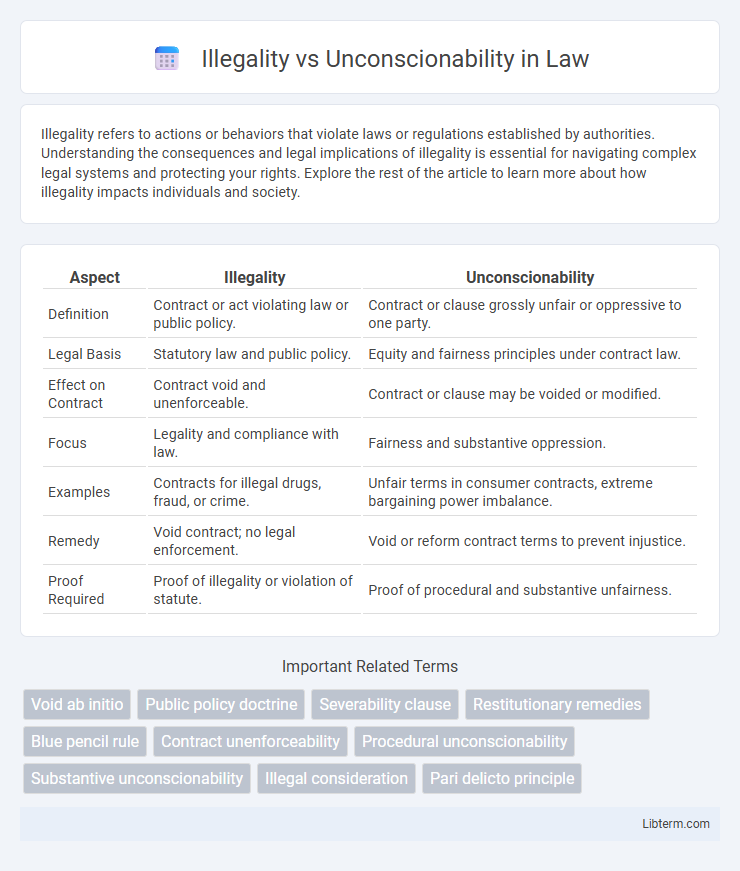Illegality refers to actions or behaviors that violate laws or regulations established by authorities. Understanding the consequences and legal implications of illegality is essential for navigating complex legal systems and protecting your rights. Explore the rest of the article to learn more about how illegality impacts individuals and society.
Table of Comparison
| Aspect | Illegality | Unconscionability |
|---|---|---|
| Definition | Contract or act violating law or public policy. | Contract or clause grossly unfair or oppressive to one party. |
| Legal Basis | Statutory law and public policy. | Equity and fairness principles under contract law. |
| Effect on Contract | Contract void and unenforceable. | Contract or clause may be voided or modified. |
| Focus | Legality and compliance with law. | Fairness and substantive oppression. |
| Examples | Contracts for illegal drugs, fraud, or crime. | Unfair terms in consumer contracts, extreme bargaining power imbalance. |
| Remedy | Void contract; no legal enforcement. | Void or reform contract terms to prevent injustice. |
| Proof Required | Proof of illegality or violation of statute. | Proof of procedural and substantive unfairness. |
Understanding Illegality in Contract Law
Illegality in contract law refers to agreements that involve actions forbidden by law or violate public policy, rendering such contracts void and unenforceable. Courts refuse to enforce illegal contracts to prevent parties from benefiting from unlawful behavior, emphasizing the importance of legality as a prerequisite for contract validity. This doctrine protects societal interests by ensuring contracts comply with statutes, regulations, and ethical standards, distinguishing it from unconscionability, which addresses fairness rather than legality.
Defining Unconscionability: Legal Perspectives
Unconscionability refers to a contract or term that is so one-sided or oppressive that it shocks the conscience of the court, rendering it unenforceable under contract law principles. Legal perspectives emphasize both procedural unconscionability, which examines the circumstances of contract formation such as unequal bargaining power or lack of meaningful choice, and substantive unconscionability, which focuses on the unfairness of the contract terms themselves. Courts employ a balanced analysis to determine whether a contract's oppressive nature justifies intervention despite the general presumption of enforceability in contracts.
Key Differences Between Illegality and Unconscionability
Illegality in contracts involves agreements that violate laws or public policy, rendering the contract void and unenforceable, whereas unconscionability addresses contracts that are unfair or oppressive due to unequal bargaining power or hidden terms. Illegality focuses on the contract's subject matter being unlawful, while unconscionability centers on the fairness of contract terms and the circumstances of agreement formation. Courts refuse to enforce illegal contracts to uphold legal standards, whereas they may rescind or modify unconscionable contracts to protect parties from unjust outcomes.
Types of Illegal Contracts
Illegal contracts include agreements involving illicit activities such as drug trafficking, gambling where prohibited, and agreements to commit crimes or fraud. Statutory illegality encompasses contracts that violate specific laws or regulations, including usurious loans and unlicensed professional services. These illegal contracts are void and unenforceable, as courts refuse to uphold agreements that contravene public policy or statutory provisions.
Forms of Unconscionable Conduct in Agreements
Forms of unconscionable conduct in agreements include procedural unconscionability, such as unfair surprise or lack of meaningful choice, and substantive unconscionability, where contract terms are excessively one-sided or oppressive. These elements often manifest through deceptive practices, unequal bargaining power, or hidden clauses that exploit one party's vulnerability. Courts evaluate unconscionability by examining the circumstances surrounding contract formation and the fairness of the terms to protect against oppressive agreements.
Legal Consequences of Illegality in Contracts
Contracts deemed illegal are void and unenforceable, leaving parties without legal remedies or court support. Courts refuse to assist parties in enforcing or recovering benefits from illegal agreements, emphasizing the principle of ex turpi causa non oritur actio. Unlike unconscionability, illegality bars any contractual enforcement due to the involvement of unlawful acts or violations of public policy.
Remedies for Unconscionable Contracts
Remedies for unconscionable contracts often include rescission or reformation to prevent unfair advantage, emphasizing equitable relief rather than strict enforcement. Courts may refuse to enforce the entire contract or sever the unconscionable terms while upholding the remainder, prioritizing fairness and justice in contractual relationships. Unlike illegal contracts, which are void and unenforceable, unconscionable contracts invoke judicial intervention aimed at protecting vulnerable parties from oppressive terms.
Judicial Approaches to Illegality vs Unconscionability
Judicial approaches to illegality focus on invalidating contracts that involve activities forbidden by law, emphasizing public policy and statutory prohibitions to prevent enforcement. In contrast, courts addressing unconscionability evaluate the fairness of contract terms, scrutinizing substantive and procedural elements to protect parties from oppressive or one-sided agreements. Both doctrines serve as equitable safeguards, yet illegality centers on legal compliance while unconscionability concentrates on fairness and moral justice in contract enforcement.
Case Studies Illustrating Illegality and Unconscionability
Case studies such as *Sherwood v. Walker* illustrate unconscionability by demonstrating contracts where one party exploits significant bargaining power disparities, resulting in unfair or oppressive terms. In *Hawkins v. McGee*, courts addressed illegality by invalidating agreements that involved prohibited activities, emphasizing that contracts formed for illegal purposes are unenforceable. These cases underscore how judicial intervention differentiates between contracts void due to illegality and those voidable due to unconscionable terms.
Best Practices for Avoiding Illegal and Unconscionable Contracts
To avoid illegal and unconscionable contracts, ensure that all contract terms comply with applicable laws and regulatory standards while promoting fairness and equity between parties. Employ thorough contract reviews focusing on clarity, mutual consent, and reasonable obligations to prevent oppressive or one-sided provisions. Incorporating clear dispute resolution mechanisms and regularly updating contracts based on legal developments further mitigates risks associated with unenforceability due to illegality or unconscionability.
Illegality Infographic

 libterm.com
libterm.com